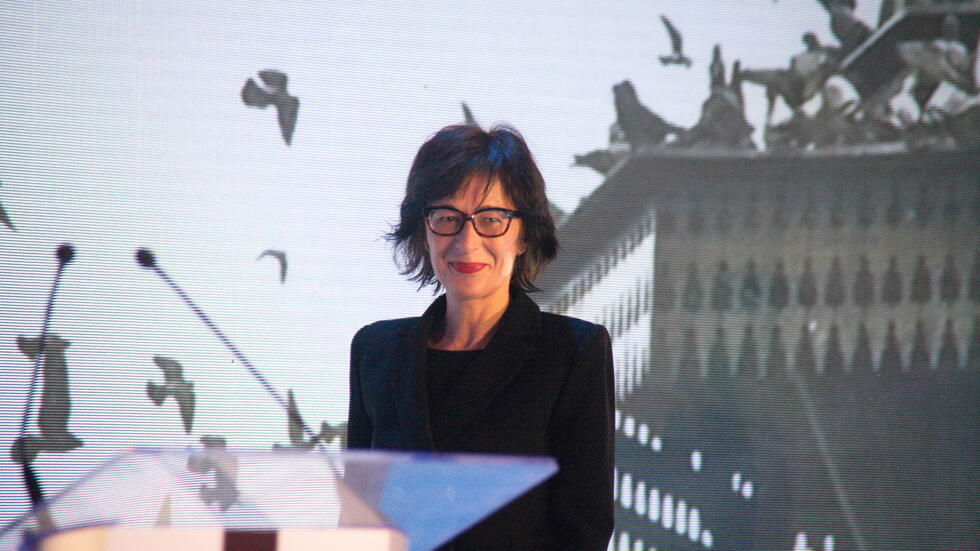French journalist to be freed from UN war crimes detention centre
Florence Hartmann, a French journalist and former spokesperson of a United Nations war crimes tribunal, was to be freed on Tuesday after serving all but one day of a week-long sentence for contempt of court. The circumstances of her arrest and detention for publishing confidential documents have led supporters to condemn the court’s handling of her case and to question its motivations.
Issued on: Modified:

Since last Thursday, Florence Hartmann had been serving a seven-day sentence in the International Criminal Tribunal for the former Yugoslavia (ICTY) in The Hague, where she was detained on Thursday as she sought to attend the verdict of former Bosnian Serb leader Radovan Karadzic.
In 2009, she was fined 7000 euros for revealing information that allegedly implicated the Serbian state in the Srebrenica massacre of 1995. With the fine unpaid in 2011, the tribunal gave her a seven-day prison sentence, but French authorities refused to arrest her, and she continued to freely travel abroad, including to the Netherlands.
“We did not expect the tribunal would be so unwise and reckless in conducting such an operation outside its premises without any authority, in our view, to carry it out, and certainly not on Dutch territory,” said lawyer Guénaël Mettraux, adding the “bad taste” of conducting “such an operation on the day that President Karadzic was being judged, someone that Florence did her utmost best as a journalist to see account for his actions before the tribunal.”
Prison sentence shortened by one day
In deciding to grant Hartmann early release, ICTY president Theodor Meron “considered that her exemplary conduct in the United Nations Detention Unit and her completion of more than two thirds of her sentence militated in favour of her release,” according to a tribunal statement.
While the ICTY maintained that Hartmann has been convicted, sentenced, detained, imprisoned and released according to official procedures, supporters and family members of Hartmann questioned whether the timing and motivations
“We’ll be able to clarify the situation and really look into what happened, because no matter what she has done, the way she was arrested was a disgraceful thing to witness,” said Hartmann’s son Stéphane Domankusic, who, prior to learning of his mother’s release, explains she reflected on her situation in a phone call from the detention unit.
“She told me that if she stayed until after 12:30 on Wednesday, she would have been the first person convicted by the tribunal to have carried out her whole sentence,” Domankusic said. “That shows the absurdity of the whole thing, because all the other criminals get out after two thirds of their sentences.”
Concerns over conditions of imprisonment
Supporters also protested her detention in conditions normally reserved for the war criminals she worked to bring to justice, first as a correspondent for French newspaper Le Monde during the wars that followed the collapse of the former Yugoslavia in the 1990s, and then as spokesperson for former ICTY chief prosecutor Carla Del Ponte from 2000 to 2006.
Before announcing Hartmann’s early release, the ICTY rejected two requests Mettraux made on Friday to improve the conditions of her detention on the basis she was being held in isolation and under “suicide watch”, in which her light is on 24 hours per day and someone checks on her every 15 minutes.
“As the only female detainee, she was separated from male detainees, in line with international best practice,” read a statement of the tribunal. “Ms Hartmann was free to receive visitors, her counsel, and consular representatives. Additionally, she had access to a phone and could receive and send mail.
“Regarding the second ground of Ms Hartmann’s complaint, it was determined that she had a light switch in her room and could turn the light on and off as she wished,” it continued, though the court was not able to confirm reports that prison officials would immediately enter her cell if she turned off the light.
Earlier Tuesday, Mettraux said he would consider approaching United Nations institutions to “have the circumstances around Ms Hartmann’s arrest and detention explored by the available bodies, with the view to determining whether her arrest and her detention by the court was legal.
“She’s been asking for no favour and no privilege over the past six years, and we feel that she’s been given no or very little justice and there was little interest in hearing what she had to say about what she did, the reason she did it and whether it was lawful or not,” he continued. “And since we cannot get that from the ICTY, we will try to have it somewhere else.”
Daily newsletterReceive essential international news every morning
Subscribe